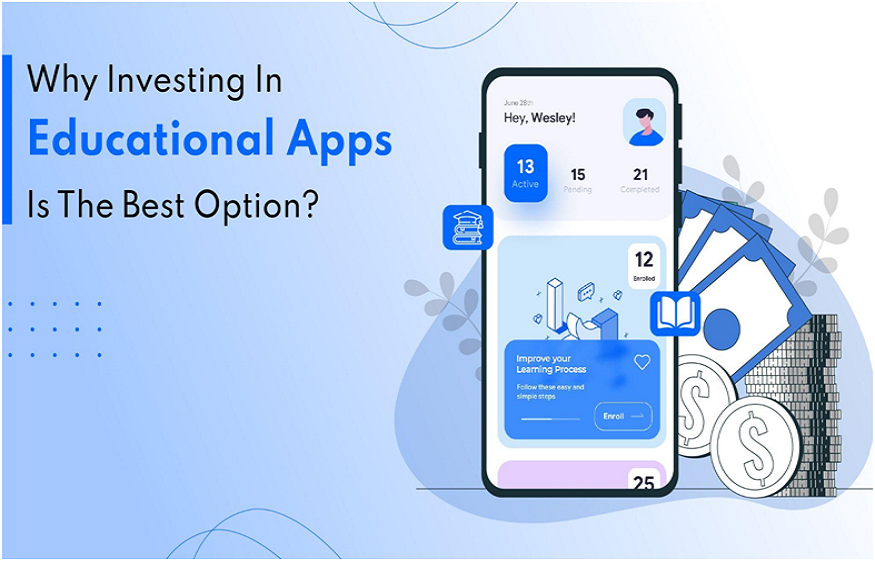Gone are the days when students have to rush to the classrooms to attend the lectures and mark their presence throughout the session. Since the covid, the education system has completely transformed and given rise to remote learning and virtual classrooms.
Mobile apps are not just for communication, entertainment, and gamification. The third most well-known mobile app category is educational apps, which have continued to grow in popularity.
Trending technologies like AI, ML, and IoT has reorganized the education system, giving all user groups greater access to facilities for online learning. The integrated learning system provides end-to-end solutions and complete knowledge to users of all age groups.
The revolutionary transformation in the educational system today facilitates the learners in the most unique way to smoothen their learning process.
This blog is about the latest features to be included in educational apps, benefits, technologies implemented in developing education apps, and cost estimation.
Latest Statistics of Educational Apps
The evolution of e-learning applications permits learners to learn and explore in the most innovative ways. But before going ahead, think about why you should consider developing a mobile e-learning app like the most popular ones today, i.e. Duolingo, Kahoot, Udemy, Coursera etc. Check out these latest facts to know more about the expanding business of education app development.
- According to the study conducted by Global Market Insights, the E-learning market crossed$315 billion last 2021. The market is forecasted at a 20% CAGR between 2022 and 2028.
- The report revealed that the global e-learning market will hit approximately $400 billion by 2026.
- In 2021, the United States e-learning market size reached $52 billion and is expected to climb to $120.67 billion by the end of 2027.
- Between 2020 and 2024, business wire expects the corporate e-learning market to increase by $38.09 billion.
- The worldwide eLearning marketplace is forecast to exceed 243 billionS. dollars.
Features of Educational Apps
Educational apps typically offer a range of features designed to enhance learning and engagement.Some of the most common features include:
- Interactive Content: Interactive content such as games, quizzes, simulations, and virtual experiments can make learning more engaging and effective.
- Video & Audio Content: Educational apps often include video and audio content, such as lectures, tutorials, and educational videos, to help students learn new concepts.
- Social Interaction: Some educational apps include social interaction features, such as discussion forums and peer-to-peer collaboration tools, to encourage students to connect and learn from each other.
- Accessibility: Many educational apps are designed to be accessible for all learners, including those with disabilities, through features such as closed captions, audio descriptions, and adjustable font sizes.
- Offline Access: Some educational apps allow students to download content and access it offline, making it easier for students to learn when they don’t have internet access.
- Analytics & Reporting: Educational apps often include analytics and reporting features, such as progress tracking and data visualization, to help students and teachers understand how well students are learning.
- Integration with Other Tools: Many educational apps integrate with other tools, such as learning management systems (LMSs) and productivity tools, to make it easier for students and teachers to use the app in conjunction with other learning tools.
These are some of the most common features in educational apps, but the exact features available will vary depending on the app and its intended audience.
Benefits of Educational Apps
You need to hire dedicated developers in India to enjoy lucrative benefits of education apps. Educational apps can bring many benefits to both students and teachers, including:
- Increased Engagement: Interactive and gamified educational apps can increase student engagement and motivation, making learning more fun and effective.
- Personalized Learning: Educational apps can provide personalized learning experiences, helping students learn at their own pace and according to their strengths and weaknesses.
- Improved Accessibility: Educational apps can make learning more accessible, especially for students with disabilities or limited educational resources.
- Anytime, Anywhere Learning: Educational apps can be used on various devices and accessed anytime, anywhere, making learning more convenient and flexible.
- Enhanced Assessment: Educational apps can provide more effective and efficient assessments, including real-time feedback and data-driven insights into student progress.
- Improved Collaboration: Educational apps can facilitate collaboration between students and teachers, making it easier for students to get help and support when needed.
- Increased Student Autonomy: Educational apps can help students take more control of their learning by providing access to resources, feedback, and assessments at any time.
- Improved Learning Outcomes: Educational apps’ personalized and interactive nature can result in improved learning outcomes, including increased retention and application of new knowledge and skills.
- Time-saving for Teachers: Educational apps can save teachers time by automating repetitive tasks and providing data-driven insights into student progress, allowing teachers to focus on more important tasks like planning and assessment.
These statistics depict that the educational mobile app industry is growing at a skyrocketing speed and has a promising future.
What Technologies Are Required for Education App Development?
Developing educational apps requires technical skills and knowledge of educational theories and practices. Here are some of the technologies that are commonly used for educational app development:
- Cross-platform Mobile Development: For maximum accessibility and reach, educational apps are often developed for both iOS and Android devices using cross-platform development frameworks such as React Native, Flutter, and Xamarin.One of the main advantages of consulting a top mobile app development company is to develop top-notch cross-platform apps.
- Back-end Development: Many educational apps require a back-end infrastructure to manage data and provide data-driven insights. Node.js, Ruby on Rails, and Django are commonly used to develop back-end systems for educational apps.
- Artificial Intelligence & Machine Learning: AI and machine learning can be used in educational apps for personalization, assessment, and recommendation systems. TensorFlow, Keras, and PyTorch are commonly used for AI and machine learning development.
- Analytics & Data Visualization: Educational apps often include data visualization and analytics features for tracking and understanding student progress.
- Virtual Reality & Augmented Reality: VR and AR can create immersive and interactive learning experiences. Unity, Unreal Engine, and Vuforia are commonly used for VR and AR development.
These are some of the technologies commonly used for educational app development, but the exact technologies used will depend on the specific requirements of the app and its intended audience.
How Much Does It Cost To Build An Educational App?
The cost of developing an educational app can vary widely based on several factors, including app complexity, development team, platform, and location.
| Country | Min hourly rate
|
Max hourly rate | Min estimated cost | Max estimated cost |
| India | $30 | $60 | $35,000 | $60,120 |
| United States | $120 | $300 | $250,800 | $350,600 |
| United Kingdom | $40 | $200 | $77,670 | $155,300 |
Multiple mobile app development companies offer these cost estimates from the top 3 nations that provide top-notch IT solutions. These are based on the average cost, as stated in Clutch. The cost completely depends on your project type and other requirements.
Good Read: How AR/VR is transforming the Classroom
Future of Education Apps
The future of education apps is expected to bring about several major advancements in the field of online learning. The future of education apps will be driven by the need to provide more effective and engaging learning experiences, using technology to enhance the educational process and improve student outcomes.
Related Article:
Here listed some key trends that are likely to shape the future of education industry:
- Increased use of AI and machine learning: The algorithms of AI and machine learning will be used to create unique and personalized experiences. For example, AI-powered learning apps could provide real-time feedback, assess students’ strengths and weaknesses, and adjust the pace and difficulty of lessons based on the students’ progress.
- Personalized and adaptive learning: Education apps will increasingly offer personalized and adaptive learning experiences, tailoring the content and pace to each individual student. This will help to improve student engagement and outcomes, by ensuring that students are learning at their own pace and in a manner that suits their learning style.
- Gamification: Many education apps will adopt a gamified approach, using elements of game design such as points, rewards, and leader boards to motivate and engage students.
- Virtual and Augmented Reality: Virtual and augmented reality technologies will become more widespread in education apps, allowing students to immerse themselves in interactive 3D environments, simulations, and games. This can help to bring subjects to life and make learning more engaging.
- Data-driven insights: Education apps will collect and analyze large amounts of data to provide insights into student performance and learning patterns. This data will help teachers and educators to better understand student needs and tailor their teaching methods accordingly.
Concluding Thoughts
Education is getting digitalized with the evolution of easy-to-use, feature-rich, and fully-functional educational apps taking over the app store. These educational apps help learners to learn concepts most uniquely. It helps the students and teachers ease the process of educating students and engage their interest more into virtual learning via mobile apps.
When it comes to creating successful educational apps, make sure you should include unique and engaging content that is easier to learn. You can join hands with a renowned education app development company or even hire an skilled and experienced education app developer for your next project.

